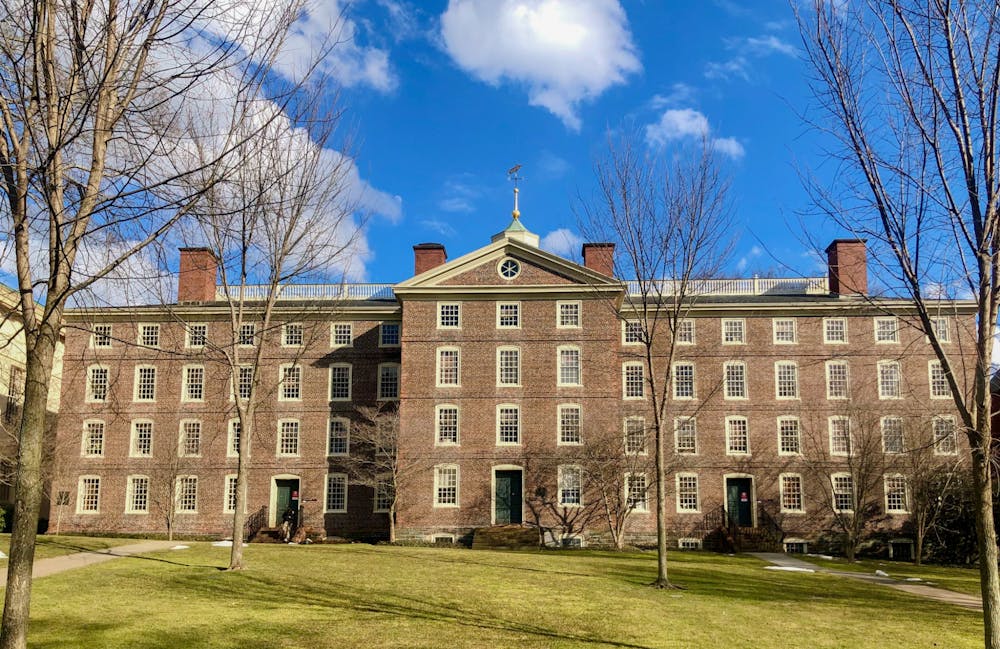University faculty voted to restrict membership of the Tenure, Promotions and Appointments Committee to tenured full professors at the first faculty meeting of the semester Tuesday. Previously, tenured associate professors have been able to be part of the committee, which provides tenure, promotion and appointment recommendations to the president and provost.
Forty-three out of the 105 voting faculty members ultimately voted in favor of the motion, with 34 voting against it and 28 abstaining from casting a vote, passing the motion.
Kenneth Wong, professor of education policy, introduced the motion on behalf of the Faculty Executive Committee.
The motion was prompted by the discovery that four full professors at the University were not tenured, Wong said, creating the need to specify in TPAC's charge that only tenured full professors can serve on the committee. Having associate professors on TPAC creates “organizational and logistical challenges” because those professors had to recuse themselves from decisions related to promotions, he added.
Several faculty members expressed concerns regarding the motion. Christopher Rose, professor of engineering, said he was wary of removing associate professors from the committee.
“What makes me a little bit nervous is that now it’s the old heads making all the decisions,” Rose said. “An early associate professor may have their ear closer to the technical ground.”
Carlos Aizenman, professor of neuroscience, agreed with Rose that including non-full, tenured professors in committee discussions allows for diverse perspectives and advice within the committee.
“There are people like distinguished senior lecturers that might be able to give better insight and comment on (certain) cases,” Aizenman said. “Associate professors can (also) bring in a great deal of expertise.”
Aizenman proposed a future conversation dedicated to identifying ways ineligible faculty members can provide input to TPAC, even if they aren’t formally on the committee.
Nancy Khalek, associate professor of religious studies and history, expressed concern that the change would negatively affect gender diversity within the committee.
“I’m concerned (because), at the moment, we have a committee … analyzing the status of women at the associate level,” she said. “I’m wondering about gender diversity and our full range of diversity and what it will mean if we limit the number of people who can serve on TPAC.”
Khalek suggested a “tiered solution where there are alternatives to cover some of the recusal” in hopes to maintain diversity within TPAC. She expressed hesitation over voting on the motion without having the demographic breakdown of the University’s full professors.
Luiz Valente PhD'83, professor of Portuguese and Brazilian studies and comparative literature, pushed back on concerns about equity.
“I am someone who has served on many committees, including TPAC,” he said. “I’m a little confused by what is not equitable about having the decisions made by full, tenured professors. I don’t know what kind of equity you would be looking for.”
“Sometimes we raise the issue of equity at Brown without really thinking hard about what it means,” he added.
Prior to bringing the motion to a vote, President Christina Paxson P’19 made note to “come back with data on the composition of TPAC over time” with the intent to “have a broader discussion on (the committee makeup) in another faculty meeting.”
Wong also presented a motion to appoint Paul Williard, professor of chemistry, as an interim TPAC member for the 2022-23 academic year. The motion passed with an 88% majority.
Correction: A previous version of this story stated that faculty and administration voted to change membership rules for TPAC, and that before the vote, non-tenured faculty could serve on the committee. In fact, only faculty voted on the motion, and tenure was already a requirement for serving on the committee. Additionally, a previous version of this article mistakenly said that the motion was prompted by the discovery that there were four non-tenured faculty on TPAC. In fact, the motion reflected the discovery that there were four non-tenured full professors in the faculty, creating the need to formalize the requirement for tenure in TPAC's charge. The Herald regrets the errors.

Sofia Barnett is a University News editor overseeing the faculty and higher education beat. She is a junior from Texas studying history and English nonfiction and enjoys freelancing in her free time.





